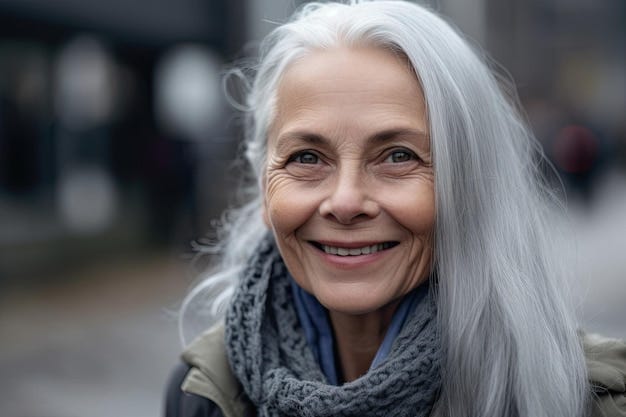Making Friends With My Grey Hair
Investing In a Stock You Know Will Go Down
Image: freepik.com
My big sister’s hair went grey in her 30s
My little brother Eddie also went grey early
I was lucky that didn’t happen to me
My hair was brown, I was 43
But a few years later my hairdresser stared at my head
I’ll never forget those words he said
‘You’ve got to accept you’ve come to the day
Where you’ve got to admit your hair’s going grey’
— Christine Lavin
A few days ago, I stumbled upon a series of pictures from an old college friend online who was attending our 30th reunion. The background seemed oddly familiar and, in fact, turned out to be the quad where I spent my freshman year. It looked almost exactly the same and stirred that strange nostalgia where, on one hand, you feel like you could just waltz back into your dorm room and expect your friends to still be hanging out there. On the other hand, there's the surreal realization that this experience was actually a long time ago. My friend looked good, but different—more like what I imagine my parents' friends should look like. The face was familiar, but he had a shock of gray hair as if he had just stepped through a time warp. “Wow,” I thought, “how did this happen?”
It’s no secret that few people enjoy the aging process and that we willingly spend vast amounts of time and money to disguise how we really look. We seem to harbor a special disdain for the process that causes the loss of pigmentation on our heads. Consider the staggering resources we allocate to this futile battle with our aging hair. Hair coloring can cost anywhere from $60 to $200 at a salon and needs touch-ups approximately every six weeks. Over a few decades, that adds up to tens of thousands of dollars spent on chemicals to make us appear a few years younger. (Coloring is just one aspect of a mix of costly body alterations that includes botox, liposuction, face-lifts, breast implants, eyelid surgery, and more.)
Unfortunately, just like acquiring a nice new couch that makes the rest of your living room look shabby, changing one feature can often highlight what has remained the same, with new lines and roundness contrasting against luxurious young locks. Eventually, it’s like a one-hit wonder band that keeps milking its success from 1973: we must let certain things go at some point. If we don’t, we risk missing one of life’s most important messages — one for which the body serves as an excellent teacher: that our time is limited, there is very little “then” or ‘later,’ and if we’re going to live life intentionally and with meaning, now is the perfect time. We may encounter difficulties if we ignore (or fail to recognize) the signals our body sends.
Body Talk
The seemingly benign graying process is part of the body’s communication with us—as if it wants us to receive a particular message. From this perspective, it’s something like: “Remember, you will not be here forever, so focus on what really matters.”
Ecclesiastes says it’s better to visit a house of mourning than a house of feasting. This may seem gloomy, even morbid, but it isn’t. Many people instinctively leave a funeral with a heightened awareness of their limited time. Although this sentiment may only last for a few days or hours, it ultimately represents a far more productive state of mind than the blissful (though temporary) satisfaction that comes from indulgence.
To deny our aging, therefore, is to deprive ourselves of critical information that can focus our attention and provide deeper, lasting satisfactions. I would argue that a proper perspective — and true peace of mind — can only come from an open and complete embrace of reality. Otherwise, we waste energy on an elaborate ruse to distract ourselves from what that truly is. Although it might not seem so, it’s a challenging and painful way to live.
Investing In a Stock You Know Will Go Down
Most spiritual traditions teach that there is a soul, a non-corporeal consciousness, associated with our physical selves. These traditions also assert that the soul is not enthusiastic about entering this world or engaging with our plane of existence's crude and lowly materialism. Nonetheless, over time, it becomes accustomed to things and may even start to see itself as merely a body and nothing more.
Such souls have a hard time moving on. The Talmud teaches that there are 903 types of death. The worst is like pulling a thick string with a knot through a tiny hole, while the best is like scooping a hair out of milk. The more attached we become to our bodies (an approach that one of my teachers described as “like investing in a stock you know will go down”) the tougher it is for the soul to take its inevitable, ultimate journey. In this light, the aging process is actually a great kindness — it loosens our attachment to the physical world, and in so doing assists in preparing us for the inevitable day of separation.
Start making friends with your grey hair
Don’t be frightened, don’t be scared
It’s here to stay, it’s not going anywhere
Start making friends with your grey hair…





I love this post. I stopped coloring my hair some years ago and still grapple to make friends with my wrinkles but assure myself often that I earned them and they're wisdom lines. I tend to have a high threshold for being "weird" but man this one runs deep. I think our intense resistance toaging is not only our desperate fear of death but the way our culture devalues, even abuses and derides its elders. Unfortunately, along with all those resources and experiences you mention in the article, we also cheat ourselves out of the deep wisdom we're meant to receive from the long-lived members of the human family. Memento mori.
"There are those who do not realize that one day we all must die. But those who do realize this settle their quarrels." ~sayings of Buddha
Perhaps one quarrel we can settle is with the aging process itself.